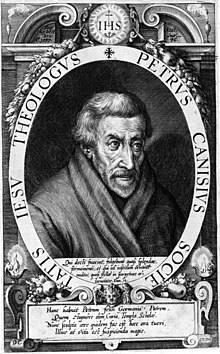Militantis ecclesiae
Militantis ecclesiae is an encyclical of Pope Leo XIII. which he sent to the bishops of Austria, Switzerland and Germany on August 1, 1897 on the occasion of the 300th anniversary of the death of the Doctor of the Church and Saint Peter Canisius or Peter Kanijs .
Doctor of the Church Petrus Canisius
Petrus Kanijs (Canisius) was born on May 8, 1521 in Nijmegen . In 1536 he began to study in Cologne . In 1546 he was ordained a priest. In 1547 he took part as a consultant at the Council of Trento , in 1548 he taught for a year in Messina , then he made his profession in 1549 , obtained a doctorate in theology at the University of Bologna and taught at various universities in German-speaking countries. He also preached in various episcopal churches, wrote numerous books and was also successful in the political arena.
Leo XIII. called Petrus Canisius, after Boniface , the "second apostle of Germany" and uses this encyclical as an opportunity to praise Canisius' work and teaching.
Modern knowledge
Using the example of this saint , the Pope describes how modern knowledge serves faith. It serves the honor of religion and defends religious science against liberal arts. It promotes the advancement of culture and serves the right education of the youth .
Reformation in Germany
The Reformation in Germany had changed moral standards and they were about to deteriorate. The number of those who left the Catholic faith would increase and would increasingly have a bad influence on the empire. But there are men with a firm belief in Germany , he continues and mentions the royal houses of Bavaria and Austria in particular .
Faith, Culture and Education
In the continuation of his encyclical he points to the connection between belief and culture and describes what, from his point of view, is important in this connection. This fact shows itself in the long tradition of Christian education and teaching and that is why the Pope emphasizes the importance of Catholic schools. Christian education, he says, is combined with religious piety so that the inspiration of the Holy Spirit may penetrate teachers and students. He denounces the countries that banned religious education in their universities (he explicitly names the University of Paris) and schools and those that refused to award and recognize the doctorate in theology .
Encouragement and admonition
In the final exhortation he calls for unity in faith. It is important to him to overcome the disagreement of spirit and the lack of harmony . His admonitions are aimed at abandoning the path of stubborn controversy ; rather, one should concentrate one's efforts to bring the Church to the same goal. Finally, he urges everyone to follow the example of Saint Peter Canisius.

